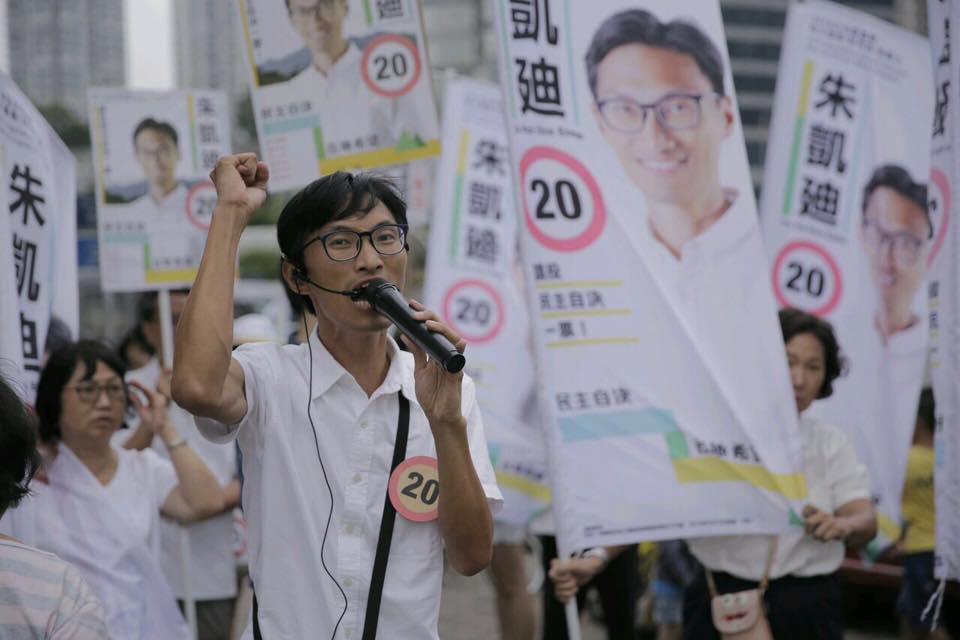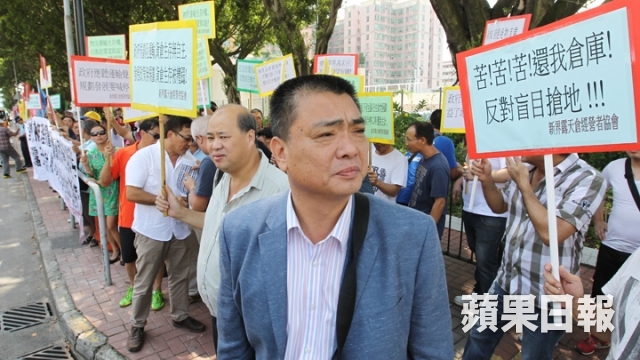by Brian Hioe
語言:
English
Photo Credit: Eddie Chu
QUESTIONS HAVE been raised in Hong Kong regarding the city’s expensive real estate and housing and the role of collaboration between government actors, land development companies, and organized crime. This is in large part prompted by the election of Eddie Chu in 2016 LegCo elections in the New Territories West constituency on campaign promises to carry out land reform. Chu is known as a long-time activist on rural issues and was one of the new candidates voted into office during 2016 LegCo elections.
In particular, what is controversial is the reduction of a public housing development in Wang Chau, Yuen Long from original plans to build 17,000 public housing units to 4,000 units. This would require the relocation of three villages, which consist of some one hundred households. Chu has accused rural leader Tsang Shu-wo of applying pressure to the government to relocate development, seeing as he was running an illegal car park on the land. The original plan would have relocated over 50,000 into Wang Chau. Chu has accused collaboration between pro-Beijing lawmaker Leung Che-cheung and Tsang as being responsible for this shift in government plans.
 Eddie Chu while giving a speech. Photo credit: Eddie Chu
Eddie Chu while giving a speech. Photo credit: Eddie Chu
Tsang Shu-wo is chairman of the Ping Shan Rural Committee, a part of the powerful “mafia-like” Heung Yee Kuk rural organization which holds a large sway over rural development in Hong Kong’s New Territories. The New Territories comprises 86% of Hong Kong’s land mass, though only 50% of Hong Kong’s population lives on it. It was a campaign promise of Chu’s that he would curtail the power of the Heung Yee Kuk.
Members of Heung Yee Kuk, such as Leung Fuk-yuen of the Shap Pat Heung Rural Committee in Yuen Long, have scoffed at Chu’s accusation of there being “dark political forces” at work in the New Territories while also intimating that there might be truth to the death threats against Chu. And, indeed, it may be that Chu presents a genuine threat to such vested interests in the New Territories as the Heung Yee Kuk. Winning by 84,000 votes, Chu garnered the most votes of any candidate during 2016 LegCo elections, likely illustrating that Chu does have the popular mandate of residents in his constituency of the New Territories West.
The Heung Yee Kuk is a statutory body formed to protect the interests of the so-called “indigenous” residents of Hong Kong who are the male descendants of any male resident of Hong Kong living in the New Territories in 1898, when Hong Kong was ceded to the British. The Heung Yee Kuk consists of representatives of rural committees in Hong Kong and has its own functional constituency in LegCo. But the Heung Yee Kuk is increasingly perceived as an instrument of vested interests which autocratically rules over the New Territories. As such, Chu has vowed to target individuals as Heung Yee Kuk chair Kenneth Lau Ip-keung, and closely affiliated pro-Beijing lawmaker Junius Ho Kwan-yiu.
 Tsang Shu-wo. Photo credit: Apple Daily
Tsang Shu-wo. Photo credit: Apple Daily
Chu has stated that there have been death threats issued against him for his support of the original plan to build 17,000 housing units and his refusal to back down on the matter. Chu has received police protection and has temporarily moved out of his home for the safety of his family. Suspected triad members tailing Chu were later arrested by police. Pan-democratic politicians as Fernando Cheung Chiu-hung and “Long Hair” Leung Kwok-hung have expressed support of Chu, and 28 pro-democracy lawmakers have signed an open letter demanding government transparency in regards to the housing project. But the pan-democratic camp would likely require the support of elements of the pro-Beijing camp in order to pass bills aimed at land reform, seeing as the pan-democrats do not have enough votes to pass bills by majority in the functional constituency of LegCo.
However, the issue of the Wang Chau housing development may point at the dark underbelly of Hong Kong politics writ large. No less than Hong Kong Chief Executive CY Leung was head of the committee convened to oversee the Wang Chau housing project. Other members of the committee included Chief Secretary for Administration Carrie Lam.
While the committee reportedly only met once, accusations are that Leung may have secretly negotiated with rural leaders. Leung denies that anything was wrong with his leadership and, after speaking with Chu by phone, has issued orders for government officials to look into the matter. But the involvement of Leung may more broadly suggest ties between the government, the Heung Yee Kuk, and triad groups, aides of Leung having been seen dining with Tsang Shu-wo and gangster Kwok Wing-hung in 2012, and Tsang having been spotted leading suspected triad members who attacked demonstrators protesting Leung in 2013.
 CY Leung. Photo credit: VOA
CY Leung. Photo credit: VOA
Thus, the matter of the Wang Chau housing complex may point more broadly towards structural issues in the larger constellation of Hong Kong politics. And if the landslide election of Eddie Chu—even without Chu having actually taken office yet—is what has led further questions to be asked regarding larger issues of collaboration between the government, vested interests, and organized crime, then perhaps we are already seeing the effects of the entrance of newcomers to legislature in 2016 LegCo elections.

